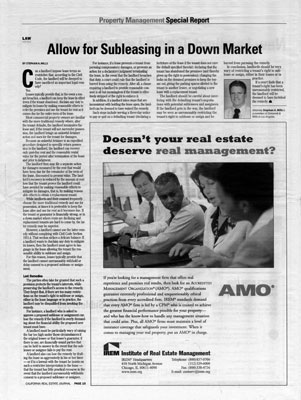 By Stephan A. Mills
By Stephan A. Mills
Can a landlord impose lease terms so restrictive that, according to the Civil Code, the landlord will be deemed to have sacrificed an important legal remedy?
Yes.
Leases typically provide that, in the event a tenant breaches, a landlord can keep the lease in effect (even if the tenant abandons), disclaim any duty to mitigate its losses by making reasonable efforts to re-let the premises and sue the tenant for rent as it comes due for the entire term of the lease.
Most commercial property owners are familiar with the more traditional remedy where, after the tenant defaults, the landlord terminates the lease and, if the tenant will not surrender possession, the landlord brings an unlawful detainer action and sues the tenant for damages. Because an unlawful detainer is an expedited procedure designed to speedily return possession to the landlord, the landlord can recover only past-due rent and the reasonable rental value for the period after termination of the lease and prior to judgment. The landlord then may file a separate action for damages measured by the rent that would have been due for the remainder of the term of the lease, discounted to the present value. The landlord’s recovery is reduced by the amount of rent loss that the tenant proves the landlord could have avoided by making reasonable efforts to mitigate its damages, that is, by making reasonable efforts to obtain a replacement tenant.
While landlords and their counsel frequently choose the more traditional remedy and sue for possession, at times it is preferable to keep the lease alive and sue for rent as it becomes due. If the tenant or guarantor is financially strong, or in a down market where rents are declining and replacement tenants are hard to come by, the latter remedy may be superior:
However, a landlord cannot use the latter remedy without complying with Civil Code Section 1951.4. That section strikes a delicate balance; if a landlord wants to disclaim any duty to mitigate its losses, then the landlord must agree to language in the lease allowing the tenant the reasonable ability to sublease and assign. For this reason, leases typically provide that the landlord cannot unreasonably withhold or delay consent to a proposed sublease or assignment.
Lost Remedies
The parties often take for granted that such a provision protects the tenant’s interests, while preserving the landlord’s access to the remedy. They forget that, if there are too many restrictions on the tenant’s right to sublease or assign, either in the lease language or in practice, the landlord may be disqualified from invoking the remedy. For instance, a landlord who is asked to approve a proposed sublease or assignment can lose the remedy if the landlord is overly demanding about the financial ability the proposed new tenant must have. A landlord must be particularly wary of raising the bar too high under those circumstances if the original lessee or that lessee’s guarantor, if there is one, are financially sound parties that can be held to answer in the event that the sub-lessee or assignee fails to pay the rent.
A landlord also can lose the remedy by drafting the lease so aggressively in his or her favor — or if in a lawsuit with the tenant he insists on such a restrictive interpretation to the lease — that the tenant has little practical recourse in the event that the landlord unreasonably withholds consent to a proposed sublessee or assignee. For instance, if a lease prevents a tenant from pursuing compensatory damages, or prevents an action for a declaratory judgment terminating the lease, in the event that the landlord breaches that duty, a court could rule that the landlord is barred from using the remedy. After all, a clause requiring a landlord to provide reasonable consent is all but meaningless if the tenant is effectively stripped of the right to enforce it.
In addition, if a landlord takes steps that are inconsistent with holding the lease open, the landlord can be deemed to have waived the remedy. Such steps include serving a three-day notice to pay or quit on a defaulting tenant (declaring a forfeiture of the lease if the tenant does not cure the default specified therein); declaring that the tenant has abandoned the premises (and thereby given up the right to possession); changing the locks on the demised premises to keep the tenant out; giving the parking spaces allotted to the tenant to another lessee, or negotiating a new lease with a replacement tenant.
The landlord should be careful about interfering with the defaulting tenant’s negotiations with potential sublessees and assignees. If the landlord gets in the way, the landlord may be seen as unreasonably restricting the tenant’s right to sublease or assign and be barred from pursuing the remedy.
In conclusion, landlords should be very wary of restricting a tenant’s right to sublease or assign, either in their leases or in their practice. If a court finds that a tenant’s right has been unreasonably restricted, the landlord will be deemed to have forfeited the remedy.

